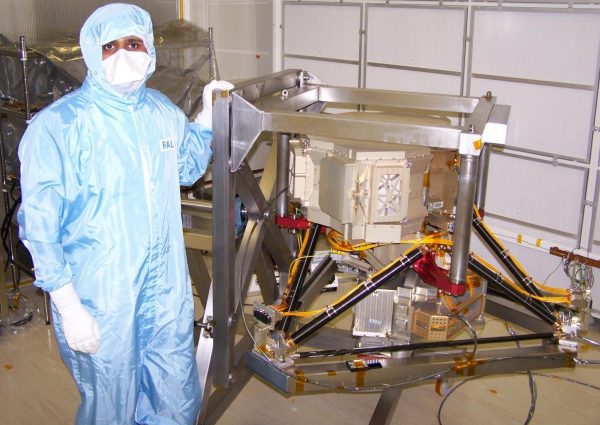Human Spaceflight and Microgravity Programme Manager, huh? That’s a long job title! What does it mean?
Yes, it is a bit unwieldy! In a nutshell, it means I coordinate things to do with:
1. Astronauts, and
2. Research in space (principally science which uses one or more aspects of being in space – such as microgravity, radiation, isolation – so this encompasses things like biology or metallurgy just as much as traditional ‘space science’, like astronomy and planetary sciences, though there is a lot of overlap).
Can you describe a typical day in your work life?
I’m not sure what a typical day is really – I’m lucky that my job involves a lot of different things. But mostly it is either at my desk in our Swindon office, where I will advise scientists on research in space or space-simulating environments; write reports; manage reviews of the work we fund; draft publicity for our website etc.
Otherwise, I am out and about quite a lot, representing the UK in European-level meetings, negotiating with our partners (particularly in the European Space Agency) to get the best deals for British industry and scientists; or speaking directly with our community in the UK to make sure we are supporting them properly.
How did you get into space science?
Well, I think I am doubly lucky to work in this area as, despite always being interested in space, my academic background is not in space – or even in science more broadly. I had experience in research funding, from working with the Arts and Humanities Research Council, and when the Agency was set up in 2011 I joined to help coordinate our Mars research. Now I work with everyone from astrobiologists to engineers, medics, material scientists, physicists – even artists and designers.
What interests did you have as a child?
Lots of things, but mostly music, art, football, video games and, of course, science and space. My Dad had old copies of Patrick Moore’s annual Yearbook of Astronomy and the Atlas of the Universe, which I would pore over for hours. (Admittedly I would spend just as long playing games like Starwing on the Super Nintendo – which I would argue was equally inspirational, albeit in a different way!)
If you weren’t a programme manager what would you be?
I have no idea – I think my job gives the perfect balance. Maybe an academic researcher/lecturer, although I’m not sure I have the patience to specialise in one subject, which is why I love the work I do now…
How did you celebrate Tim Peake’s launch into space?
I had the great honour to be there in Kazakhstan for launch – a real once-in-a-lifetime experience. Baikonur is the most significant site on Earth in the history of space exploration, so a great place to witness Tim making history of his own.
Once the drama of the Soyuz docking was over (two aborted attempts before they finally managed to rendezvous safely with the Station), I enjoyed a glass or two of champagne and tried to get a few hours sleep before the looong journey back home (about 24 hours travel!).
What advice would you give your eight-year-old self about building a career in space science?
Space is such a broad sector, you really shouldn’t focus on just one route to getting involved. Tim Peake is the most visible person in a huge international team of engineers, scientists, medics, trainers, translators, even accountants and lawyers (and of course the heroic programme managers!) – all talents are needed so focus on what you’re good at, work hard and make sure you enjoy it.
I would specifically encourage the eight-year-old me not to be put off science if it doesn’t seem very inspiring at school. It is worth remembering that STEM subjects will improve your chances of a job in space.
//
Andrew makes a cameo appearance in Chapter Four of the Principia Mission Space Diary. Log in or sign up to the Discovery Diary website to download your own copy of the Space Diary along with teaching notes and resources.
The Principia Mission Space Diary is one of nine education projects funded by the UK Space Agency and the European Space Agency, to support the education aims of Tim Peake’s mission to the International Space Station. Find out more about the Principia education projects here.



